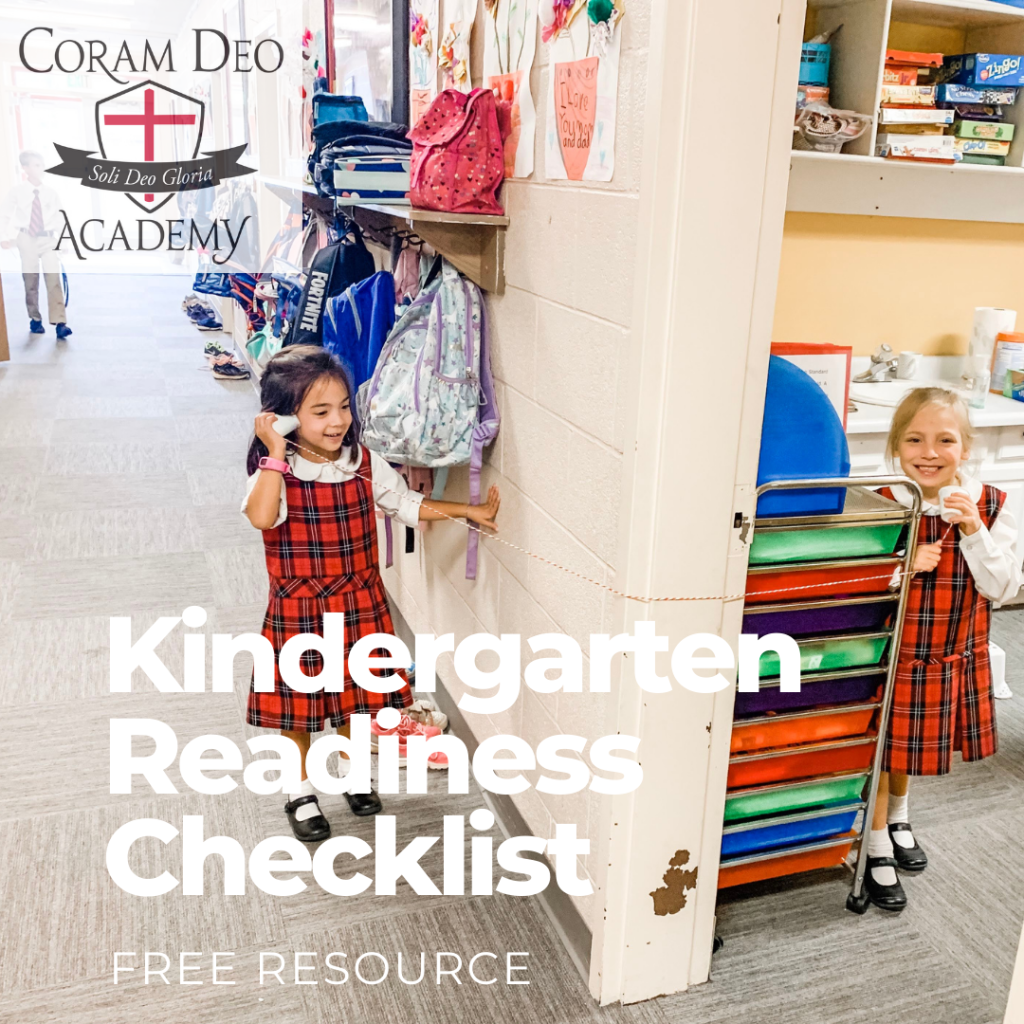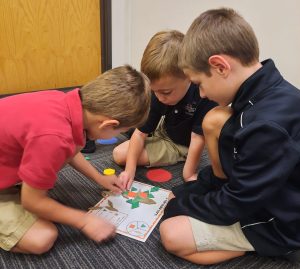Written by DeeDee Feeney | 4.14.20
At Coram Deo Academy, we help our students practice habits that will benefit them for life, not just for school. Rather than using behavior modification, we focus on character by helping our students practice Attention, Obedience, Respect, and Responsibility. Over the next few weeks, I will share with you ways you can continue to use these habits in your home.
Read the Introduction to this series, or other articles: Attention, Respect, and Responsibility.
Obedience: “Responding to authority with a happy heart.” “Responds right away, all the way.”
As we discussed previously, attentiveness as a habit needs to be established before we can adequately teach any of the other habits. By practicing the habit of attention, we can be attentive to the world around us, those in authority over us, and, most importantly, to our Lord. We will have a hard time with obedience unless we first practice attentiveness.
Jesus’ words continue to ring true here: “Everyone then who hears these words of mine and does them will be like a wise man who built his house on the rock” (Matthew 7:24).
Jesus desires obedience. Paul similarly commands in Ephesians, “Children, obey your parents, for this is right. Honor your father and mother, which is the first commandment with a promise, so that it may be well with you and that you may live long on the earth” (Ephesians 6:1-3).
Training your child in the habit of obedience is one of the most important jobs you have as a parent.
God created every child with the ability to obey, or He would not have given this command. However, because of our sinful nature, children do not have the strength of will to resist the temptation to disobey. As a parent, your job is to strengthen your child’s will.
Training your child in the habit of obedience is one of the most important jobs you have as a parent. Remember, good habits are formed by slow, methodical training – encouraging appropriate behavior and discouraging inappropriate behavior. You have been equipped by God to do this job.
Three practices will help you in training your child in the habit of obedience:
1. Consistency – You must practice obedience every day. Don’t take a holiday. Parents need to be in agreement, as well.
2. Modeling – Our children are watching us.
3. Loving our children well – Practice Ephesians 5:1-2: “Be imitators of God, as beloved children; and walk in love, just as Christ also loved you and gave Himself up for us.” When we love our children unconditionally, as Christ loves us, they will want to obey.
Explain to your child the reward of obedience.
Now let’s get practical with some tips that will help you while you are training your children in the habit of obedience. Like with any of these habits, make sure you sit your child down and let them know you will be working with them on the habit of obedience.
♥︎ Give your instructions once.
Expect first-time obedience. Make sure you have your child’s attention. Say their name and have them respond with a “yes ma’am/sir,” “yes,” or “I’m coming.” Then make sure they are looking at you before you give the instruction.
This will take some practice on your part. I oftentimes forgot to say their name and just began rattling off an instruction. Believe me, it works so much better when you first say your child’s name and wait for their response.
♥︎ Give your direction in a pleasant but direct voice.
There is no need to yell or sound angry when giving instruction. Your child should then respond with “yes ma’am,” or whichever response you require in your home. But they must respond for you to ensure that they heard you.
♥︎ Expect a prompt response with a respectful attitude.
When teaching this, be clear. Prepare them for how they might feel and what reactions they may have that you will not allow. Your child may not be happy that he must stop doing what he wants to do, but he needs to practice having a respectful attitude and responding promptly.
Do not allow them to say, “But I’m not finished,” “but if I could have just a few more minutes,” etc. When you allow the “buts” to take place, they will happen every time you give an instruction. As a kindergarten teacher, I always have my “but” children. These are the children that always have a “but” after every one of my instructions. This will take some training and clear instructions and expectations.
Have them try again if you get a disrespectful response. Do not allow screaming, stomping of feet, throwing of toys, or crossing of arms to show their anger.
Whenever possible, give your child a time that they have left in their activity. Then when that time is up, expect first-time obedience with a respectful attitude. Again, be clear about what you expect at the beginning of your training.
♥︎ Play games as part of your training.
We made games out of teaching first-time obedience. Think Mother May I? and Simon Says combined. We would make up all sorts of fun things for our children to do while practicing first-time obedience. Be creative. Your children will enjoy this part of learning to obey the first time.
♥︎ Don’t fall into the habit of counting down for them to obey.
This only trains them that they can wait until you start counting before they begin obeying. If you have already started this habit (I had), sit your child down, and let them know that you are sorry for not giving them the chance to obey the first time. Let them know that you are going to let them practice first time obedience. I have used this, and it works beautifully.
♥︎ Explain to your child the reward of obedience.
The reward of obedience is freedom and independence. The more your child obeys, the more freedom he will earn. Your child may play outside freely because you know they will come in when they are called. You feel comfortable taking your children out to eat because you know they will obey the first time if correction is needed.

Your home is the laboratory or testing grounds that your children need to use to push the limits, and they will take their job to do so with vigor.
The Feeney children earned our trust by obeying in the home. For example, as they grew, we had a strict curfew with instructions to call if there was any reason they would not make the curfew, even by a few minutes. Our children obeyed. Because they obeyed, they were given more freedom when they asked.
Just recently, we asked my adult children if they ever snuck out or went anywhere they were not supposed to go. They all said no. They said that they felt we had given them just enough freedom that they didn’t need to sneak around. This was encouraging. Your ultimate goal is for your child to desire to obey. Training your children in the habit of obedience at a young age will benefit them for life.
Your home is the laboratory or testing grounds that your children need to use to push the limits, and they will take their job to do so with vigor. When you diligently practice the habits of the heart at home, your experience with your children outside the home will be transformed into a more pleasurable experience for you and for them. You will know that you have been successful with instilling the habits of the heart when family, friends, and even strangers compliment you on the behavior of your offspring in the world outside your front door.

Read DeeDee’s Bio
RSVP for an Open House





